38 Important Camping Items You Should Never Forget
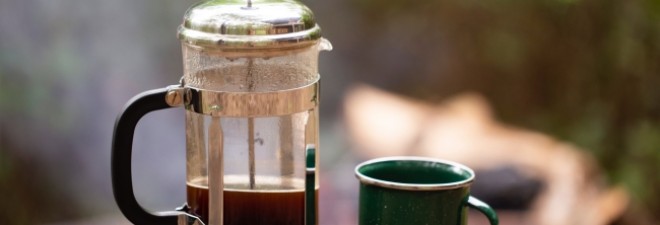
Have you ever arrived at a campsite, started setting up your tent or unpacking the car, and then realised you’ve forgotten some important camping items? It can happen even if you’re a camping expert but it’s a real pain especially if you’re nowhere near a shop that sells camping gear.
Which is why we’ve put together a list of important camping items that guarantees you will have everything you need when you go on holiday. Let’s dive in!
1. Top quality tent
It would be unusual to forget the tent if you’re going camping but it can happen. This is why it’s important to double check that you have actually packed it. Buying a quality tent is important for getting a good night’s sleep, for safety and privacy and keeping your clothes and gear dry.
But most of all, your tent should be easy to set up, so you don’t waste that much time on it and can commit to other fun camping activities!
2. A mallet or hammer
Setting up a tent often requires driving stakes into the ground, and a mallet or hammer makes this task much easier. It ensures that your tent is securely anchored, protecting it from wind and potential damage. This small tool can save you time and effort during the setup process.
3. Suitable clothes
When camping you need to bring suitable clothing to protect your body from different types of weather. If cold or windy weather is expected, then bring your comfy warm hoodies and a wind breaker.
If it is going to be rainy, then a waterproof raincoat or jacket. But, if it is going to be hot, then some light breathable fabrics should be the way to go. And, don’t forget a hat and sunnies!
4. Hiking gear
Byron Bay has great hiking and walking trails. But you need to bring decent hiking shoes or walking boots if you don’t want to be hobbling for days afterwards with blisters or sore feet.
A good trick is to break them in for a couple of weeks before you set out on your journey. Camping is not the time for fashion, so pick the shoes that protect your feet and won’t wear out.
5. Water
The one thing you never want to find yourself without while camping is water. It’s extremely important to stay hydrated, especially when the weather is warm or you’re doing physical activities like walking, hiking, and setting up a campsite.
In addition to staying well-hydrated, you’ll want water on hand for brushing your teeth, washing utensils, and more, especially if you’re not close to facilities with running water.
Rather than packing dozens of plastic water bottles, bring a large jug and a refillable water bottle. If you’re camping deep in the wilderness, you might want a water filtration device that will make any fresh water source potable.
6. First Aid kit
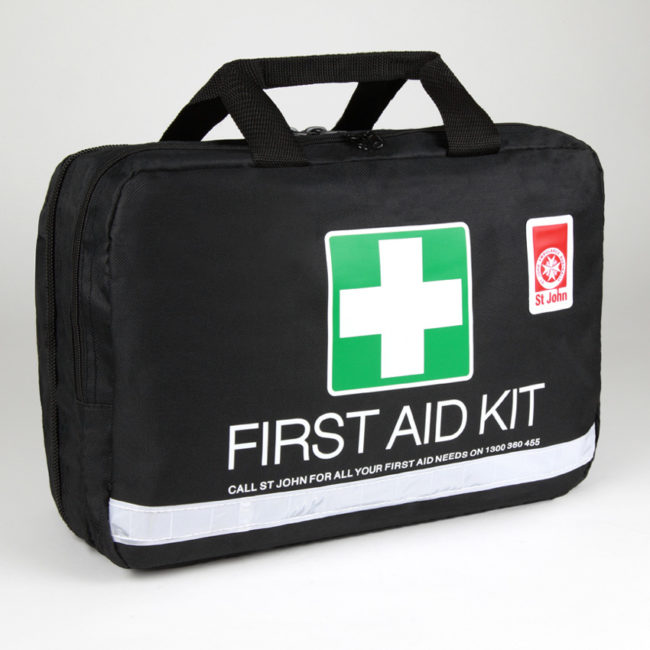
Image source: St John
This camping item is a must-have! You never know what may happen. You can accidentally cut yourself, injure your knee, or have a headache. And when camping, a chemist isn’t on every corner. Therefore, make sure to bring bandages, aspirin, other pain killers, and allergy pills to keep everyone safe.
7. Electric chargers
If you want a complete off-the grid experience, then you may consider skipping this part. However technology, such as cameras, tablets, phones, and kindles, can come in handy if you want to take photos, need to phone ahead to make a campsite booking, or want to keep the kids entertained on a rainy day.
So do a check to ensure you have all the right chargers for your gadgets before you leave and choose a campsite or accommodation with electricity so you can charge them when you get there. Alternatively you could look at getting a solar power charger if you don’t want to rely on electricity.
8. Jumper cables
Jumper cables are an often overlooked but vital item for your camping trip, particularly if you’re traveling by vehicle. A dead car battery can quickly turn into a frustrating situation, especially when you’re far from help.
Having jumper cables on hand can save you from being stranded and provide a means to jumpstart your vehicle using another car’s battery.
9. Lantern or flashlight
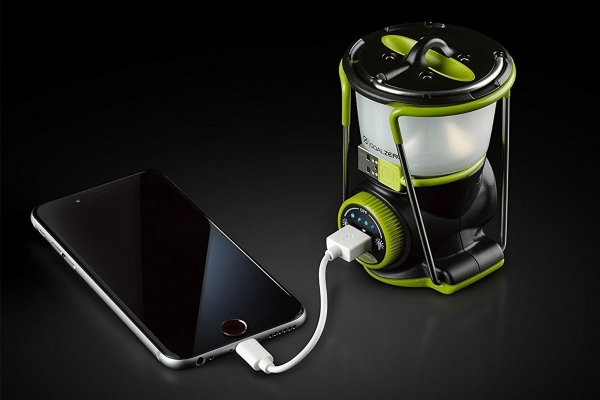
To light your path on dark nights, be sure to bring a flashlight or lantern and batteries and/or a charger. A reliable light source will not only help you see better when the sun goes down, but will also come in handy in case of emergency.
10. Scissors
Packing a pair of scissors is a small detail that can make a big difference during your camping adventure. Scissors come in handy for a variety of tasks, from cutting food packaging to trimming thread and repairing gear. Their versatility makes them a valuable addition to your camping toolkit.
11. Batteries
Don’t forget to pack extra batteries for your electronic devices and gear. Many essential camping tools, like flashlights, lanterns, and GPS devices, rely on batteries for power.
Having spare batteries on hand ensures that you won’t be left in the dark or without crucial equipment in case the originals run out of charge.
12. Extra sleeping gear
It’s not essential to have inflatable camping beds or fancy sleeping bags when you’re camping. But they make you feel more comfortable and can help overcome sleeplessness when you’re camping. If you’re not a great sleeper then you might want to pack one or all of them to avoid getting grumpy from lack of sleep, not to mention a sore back or neck.
13. Wet wipes & quick hygiene
If you’re camping somewhere without an amenities block, a hot shower won’t be readily available. However if you have a pack of wet wipes on hand you can quickly feel refreshed after a day of hiking or spending time at the beach. Dry shampoo is also the perfect camping accessory if you can’t access a shower.
Pack a bottle or two of hand sanitiser too, this is not only for stopping the spread of the coronavirus, but also good for cleaning and disinfecting hands before a snack or lunch if water is in short supply.
14. Toothbrush and toothpaste
While it might seem like a small thing, packing a toothbrush and toothpaste is essential for maintaining oral hygiene during your camping adventure. Even when surrounded by nature, dental care remains important to prevent cavities and maintain fresh breath.
Proper dental hygiene can also help prevent discomfort that might arise from dental issues during your trip.
15. Insect repellent
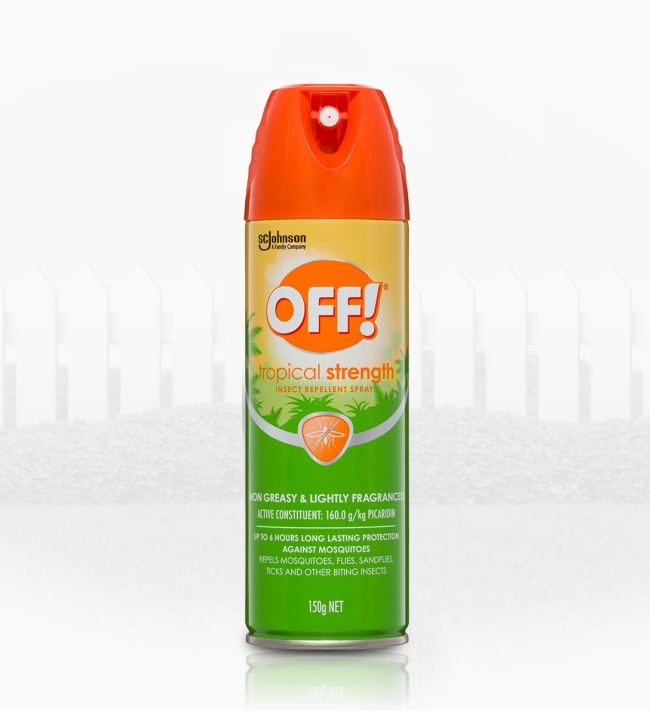
In spring and summer you might want to ensure you have insect repellent with you. They’re only tiny but mosquitos can be annoying at a campsite when you just want to be enjoying yourself. So if you don’t want to spend days or nights scratching don’t forget this camping item!
16. Extra socks
Packing extra socks might seem like a minor detail, but it’s a crucial consideration when camping. Feet are prone to sweating and getting wet, especially during outdoor activities.
Wet feet can lead to blisters and discomfort, which can hinder your enjoyment of the trip. Carrying extra pairs of socks ensures you can change into dry ones, promoting foot comfort and preventing potential foot-related problems.
17. Feminine hygiene products
Feminine hygiene products are a vital consideration for female campers. Being prepared with the appropriate products ensures comfort and confidence during your trip, regardless of the environment. Proper planning also promotes cleanliness and sanitation in outdoor settings.
18. Sun protection, lip balm
Nothing takes the fun out of a camping trip like a painful sunburn. When you’re outdoors, protect yourself from harmful rays with sunscreen, a wide-brimmed hat, light layers, and lip balm with SPF.
19. Anti-itch ointments
Nature often comes with insects and potential irritants that can cause itching and discomfort. Carrying anti-itch ointments or creams can provide relief from insect bites, rashes, or other skin irritations.
Keeping these items on hand ensures that minor discomforts don’t overshadow your camping experience.
20. Glasses and/or contacts, lens wipe, and/or contact solution
If you wear glasses or contact lenses, remembering to pack these items is essential for maintaining your vision and eye comfort. Bringing lens wipes or contact solution ensures that you can keep your eyewear clean and functional, even in outdoor environments.
21. Energy boosters
If you love camping activities, such as cycling around, hiking, or building a sandcastle with you kids, then you will need a lot of energy! The main camping item that can give you a good source of energy is food.
That means you should bring some healthy snacks, full of grains and nuts to boost your energy levels when you’re out and about, this is especially important if you have kids.
22. Dry goods and nonperishable foods
Dry goods and nonperishable foods are also crucial for sustenance while camping. These items have a longer shelf life and won’t spoil easily, making them suitable for outdoor adventures where refrigeration might be limited. They offer a convenient and reliable food source, ensuring you have nourishment even in remote locations.
23. Pet supplies and food
If you’re bringing along your furry friend, don’t forget to pack their supplies and food. Just like humans, pets have specific needs, and being prepared with the right supplies ensures your pet’s comfort and well-being during the trip.
Remembering their food, water, leash, and any necessary medications is essential for a smooth camping experience with your pet.
24. Coffee or tea
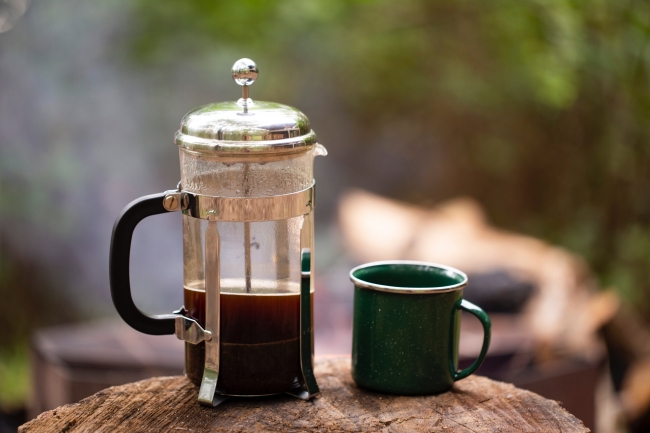
For many campers, a warm cup of coffee or tea in the morning is an essential ritual that helps start the day on the right note. Packing your favourite brew can provide a sense of comfort and normalcy while enjoying the great outdoors, allowing you to savour familiar flavours amidst the wilderness.
When it comes to brewing coffee while camping, there are several methods to choose from, each with its unique advantages. Depending on your preferences, available space, and resources, you can select the method that suits your camping style best.
Instant Coffee
Instant coffee is one of the simplest and most convenient options for camping. All you need is hot water, and you can have a cup of coffee ready within seconds. While it may not offer the same flavor complexity as freshly brewed coffee, it’s a quick and easy solution for those who prioritize convenience.
French Press
A French press is a popular choice among campers who appreciate a richer, full-bodied coffee experience. It’s relatively lightweight and compact, making it a great addition to your camping gear.
Simply add coarsely ground coffee and hot water, let it steep, and then press down the plunger to separate the grounds. The result is a flavorful cup of coffee that’s closer in taste to what you might enjoy at home.
Pour-Over System
If you’re a fan of a precise and customisable brewing process, a pour-over system might be your best bet. These systems typically consist of a cone or dripper that sits on top of your cup or carafe.
You manually pour hot water over the coffee grounds in a controlled manner, allowing you to tailor the strength and flavour of your coffee. This method requires a bit more attention but can lead to a high-quality brew.
Percolator
For campers who enjoy a classic coffee experience, a percolator can be an excellent choice. Percolators are known for producing strong and robust coffee. Water is repeatedly cycled through the coffee grounds, creating a rich flavor profile.
While they may be bulkier and heavier than other methods, percolators can provide a nostalgic camping coffee experience.
Portable Coffee Makers
Various portable coffee makers, designed specifically for camping, have entered the market. These devices use innovative techniques to brew coffee quickly and efficiently.
Some models use pressure to extract coffee, similar to espresso machines, while others use drip methods. These options combine convenience and quality, making them a favourite among campers who prioritise a great cup of coffee.
25. Proper food storage
When camping, it is important to keep all food securely stored to keep it fresh and also to keep animals away from your campsite. Coolers and insect-resistant food containers are good options.
Some campgrounds also recommend hanging food from a tree overnight to keep animals from accessing your food stash while you sleep.
26. Navigation tools
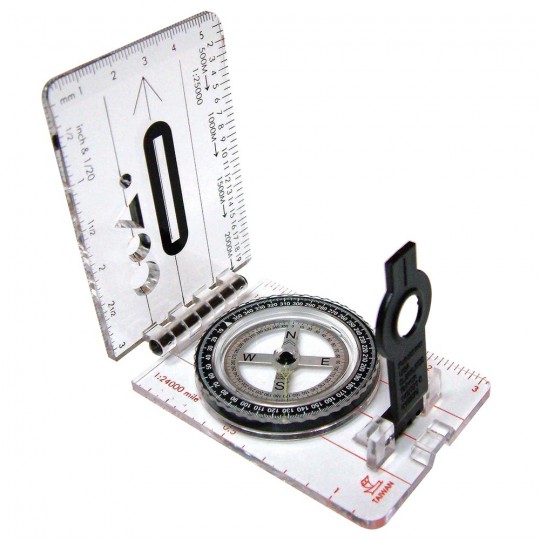
Nature is great, but if you’re worried about getting lost then please don’t rely on your Smartphone or Google Maps. It’s better to save your phone battery and have navigation tools to help you out, as well as a light source in case it gets dark, such as a:
- topographic trail map
- compass
- flashlight and/or headlamp.
Make sure that you learn how to use a compass and how to read a map before you go out hiking, and pack these important camping items!
27. Rubbish bags
Responsible camping includes leaving no trace behind. Packing rubbish bags is a must to ensure you leave the campsite as you found it. These bags help you collect and dispose of any food scraps or other waste properly, reducing your environmental impact and preserving the natural beauty of the area for others to enjoy.
28. Camp chairs
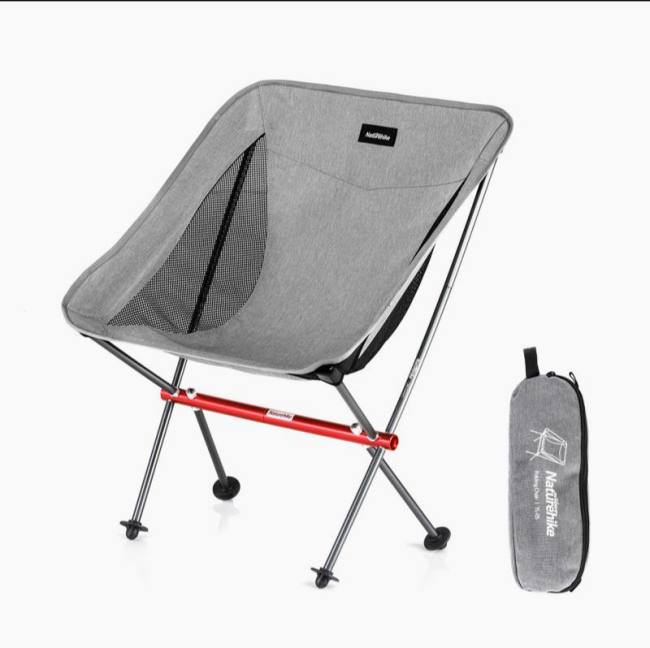
Your campsite won’t be complete without a comfortable place to sit, relax, and enjoy the peace and quiet of nature. Luckily, lightweight collapsible camp chairs are easy to pack and unfold.
29. A folding table
A folding table is a valuable addition to your camping setup. It provides a clean and elevated surface for preparing food, playing games, or simply enjoying a meal. Having a stable surface can greatly enhance the convenience and comfort of your campsite.
30. Cookware
To make the most of your time outdoors, make sure you have everything you need to prepare a meal for yourself or your loved ones. The supplies you’ll need will depend on how well-stocked your campsite or cabin will be, so find out what you’ll need and plan your meals before you go.
If you’re in the wilderness, you might plan to cook over a fire, or if you’re at a campsite like Broken Head Holiday Park you’ll have access to BBQs and a kitchen.
Even in a very basic campground without any modern appliances, you can still create a satisfying meal with a few simple tools and a campfire or grill. Campfire cooking tools include a metal grate, aluminium foil, an iron skillet, a coffee pot or kettle, tongs, knives, utensils, camp mugs, and plates or bowls.
31. Toilet paper
Depending on where you’re camping, you might not have access to clean public or private toilets, so don’t forget the toilet paper!
32. Towels
Towels have multiple uses during a camping trip. They can dry you off after swimming or rain, serve as makeshift picnic blankets, and help with general cleaning tasks.
Quick-drying and absorbent towels are particularly useful, as they can handle a variety of tasks while taking up minimal space in your camping gear.
33. Clothesline
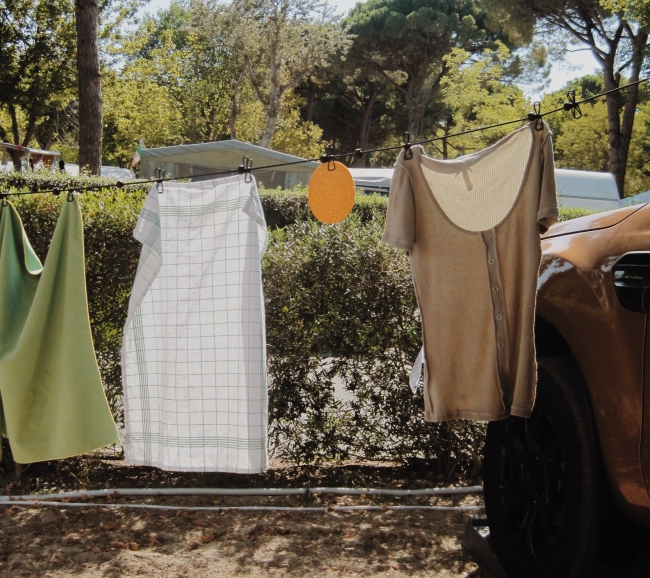
A clothesline might not seem like a priority, but it’s incredibly useful for drying wet clothes, towels, and other gear. It’s common for items to get damp during outdoor activities or rain showers, and having a clothesline helps prevent mildew and keeps your belongings clean and dry.
34. Umbrella
An umbrella might seem like an odd choice for a camping trip, but it can prove to be incredibly versatile. In addition to shielding you from rain, an umbrella can provide portable shade on sunny days.
It’s a quick and easy solution for staying dry during short walks and can even double as a makeshift shelter in certain situations.
35. Sunshade or tarp
A sunshade or tarp provides essential protection from the elements. Whether you’re seeking relief from the sun’s intense rays or need a shelter to stay dry during unexpected rain, a sunshade or tarp creates a versatile outdoor living space that enhances your camping comfort.
36. Essential documents and medicines
When packing for a camping getaway, it can be easy to forget the basics. Even if you don’t think you’ll need them, make sure you have your identification as well as any necessary permits and licenses just in case!
Also, bring any prescription medications you may need. To keep your important documents and medicines safe from the elements, place them in a waterproof case or sealable plastic bag.
37. Recreational gear
The items you bring on a camping trip will vary depending on who you are and what you love to do. If you enjoy fishing, don’t forget a rod and tackle box. If you love photography, bring a camera. If you’re camping with kids, pack extra clothes, snacks, and a game to keep them entertained.
Perhaps you want to relax with a good book, or bring a nature guide to observe local wildlife. However you want to spend your camping trip, bring the items that will enhance the experience for you.
38. Duct Tape
Duct tape is often hailed as the “handyman’s secret weapon”, and its versatility makes it a valuable addition to your camping gear. From quick repairs to gear and equipment to creating temporary fixes for unexpected situations, duct tape can be a lifesaver. It’s a lightweight and compact item that can serve a variety of purposes in the outdoors.
Here are more ways duct tape can be useful while camping:
- Gear Repair: Duct tape is renowned for its ability to temporarily mend broken or damaged gear, such as torn tent fabric, ripped backpack straps, or even a leaky air mattress. It can help you extend the life of your equipment until you can make more permanent repairs.
- Foot Blister Prevention: If you feel a blister forming on your foot, placing a small piece of duct tape over the affected area can help reduce friction and prevent it from worsening.
- Repairing Bug Screens: If your tent’s bug screen gets damaged, you can patch it up with duct tape to keep insects out while still maintaining some airflow.
- Sealing Containers: Duct tape can help seal containers holding food, preventing spills and keeping your supplies secure.
- Creating Splints: In case of a minor injury, duct tape can be used alongside sticks or other materials to create a makeshift splint to immobilize a sprained or strained area.
- Fixing Glasses: If the frame of your eyeglasses breaks, wrapping duct tape around them can provide a temporary fix to hold them together.
- Labeling: Use duct tape to label your belongings or mark different items, making it easier to locate things quickly in your camping setup.
- Repairing Rain Gear: If your rain jacket or other waterproof gear gets a tear or hole, duct tape can temporarily patch it up and keep you dry.
- Cushioning: Wrap duct tape around the handles of tools or utensils to create a more comfortable grip.
Where to camp?
Where better to holiday than Byron Bay? Broken Head Holiday Park makes a great base for exploring the area, as well as offering powered campsites, beach shacks and camp facilities such as a camp kitchen, BBQ area, laundry, showers and a camp kiosk with basic supplies. Book your spot today!





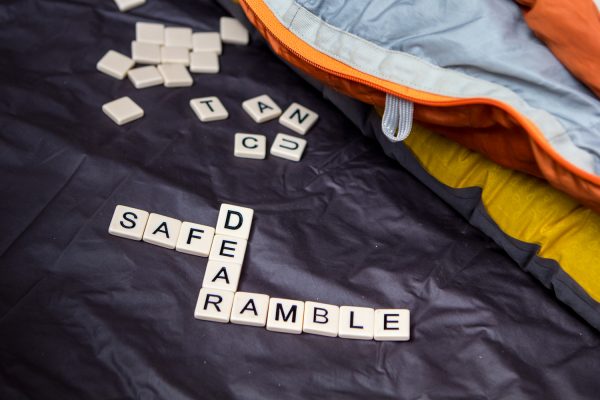



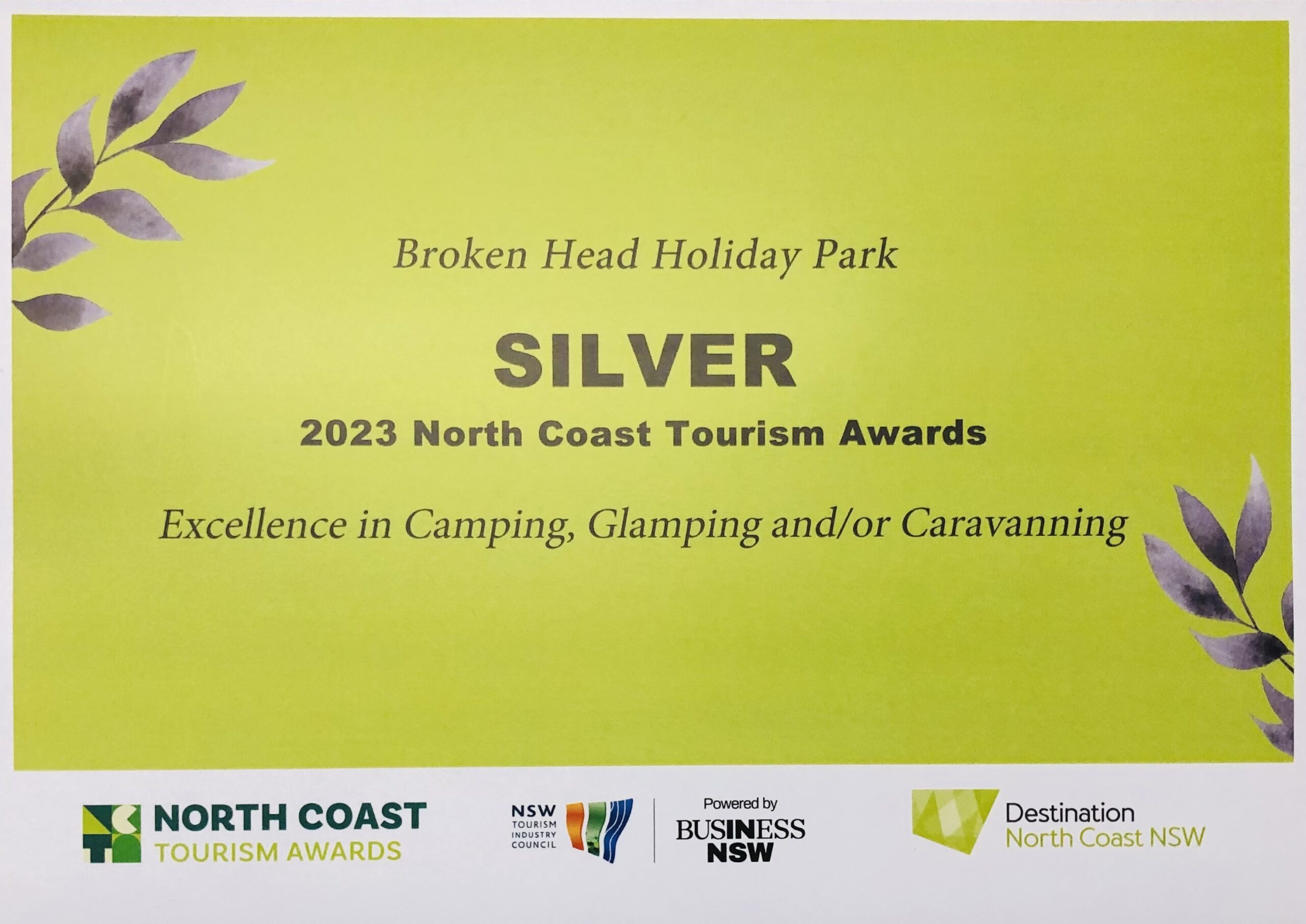
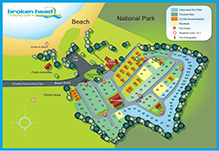

This Post Has 0 Comments